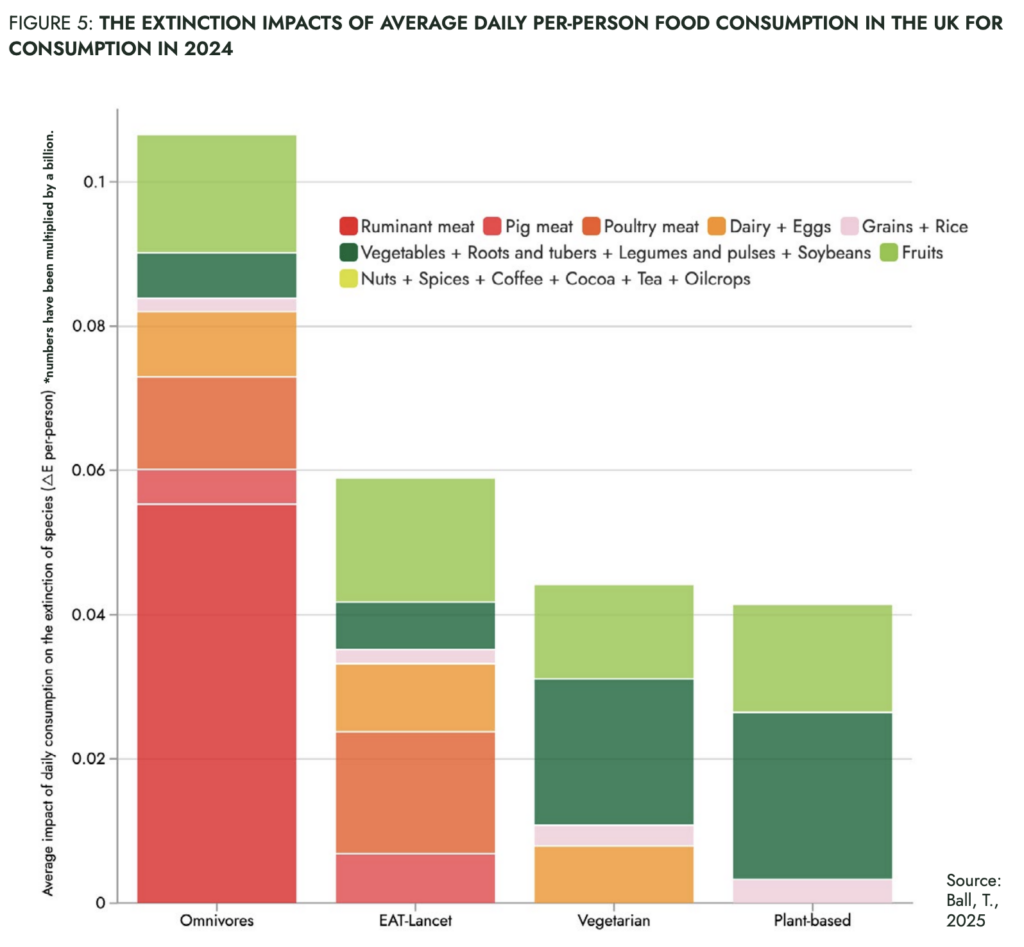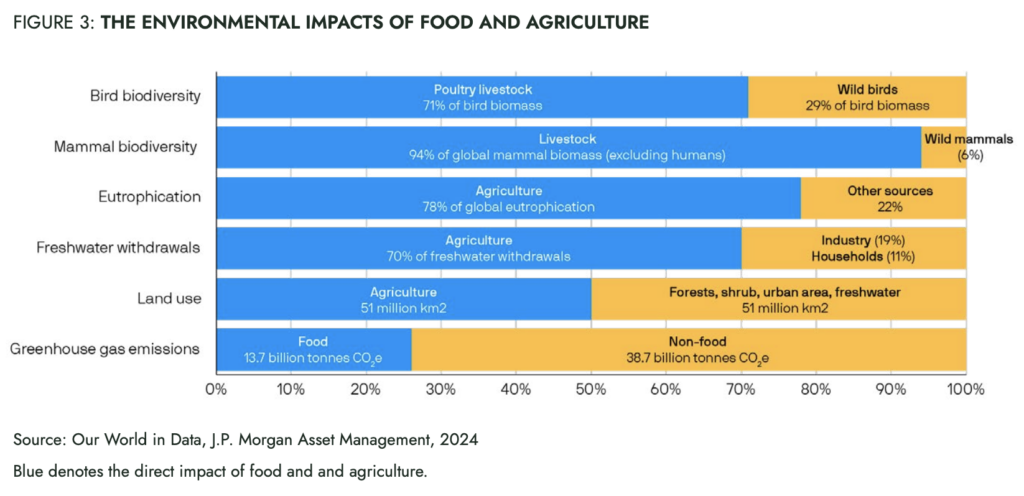
Food companies in the UK must accelerate a switch to plant-based diets to fight climate change and lower the risk of biodiversity extinction, according to a new report.
Global wildlife populations have shrunk by 73% in the last 50 years, primarily due to human activity. Without urgent reforms to the food system, the world’s journey towards a sixth mass extinction event will only accelerate, a report by the UK’s Food Foundation shows.
“Food production and diets – particularly those high in animal-source foods – play a critical role in driving this catastrophic loss of biodiversity and nature,” it stated. Agriculture contributes heavily to greenhouse gas emissions and biodiversity loss, and exerts pressure on ecosystems in several ways.
Food production damages biodiversity, but at the same time, a loss of biodiversity can harm food production. “Rethinking what we eat and how we produce food has the potential to mitigate the harm current food systems are having on nature and the environment, as well as unlocking significant benefits for public health and the economy,” the report said.
“Changing how we produce food and shifting diets towards more healthy and sustainable plant-rich patterns ought to be a key strategy for ensuring the sustainability of our food supply and safeguarding our future.”
How meat production is driving biodiversity loss

The report warned that the UK government’s failure to address biodiversity loss in the agrifood industry right now will lead to much greater economic costs down the line. Nature loss is set to reduce the country’s growth by 6-12% in the 2030s, exceeding the impacts of the 2008 financial crash or Covid-19.
Acting swiftly to protect nature and biodiversity could generate $10T in economic value and nearly 400 million jobs globally by the end of the decade, but postponing action by just 10 years could double today’s intervention costs.
Agriculture is the primary driver of nature and biodiversity loss, and the current system of subsidies reinforces harmful production and consumption practices, causing $4-6T in climate damages every year. There are plenty of opportunities to transform the food system, though, with a shift to plant-rich diets among the most viable and effective.
“Diversifying consumption patterns away from high intakes of less healthy foods and animal-source products, and increasing intakes of plant-rich foods, has climate, nature and health benefits,” the report said. The net benefits of transforming food systems to be healthier and more sustainable while providing decent livelihoods have been estimated at $4.5-10B annually.
“Current UK dietary patterns, especially the consumption of red or ruminant meats like beef and lamb, are directly linked to increased extinction risks for numerous species,” the organisation wrote. On average, Brits consume twice as much meat as the global average. But “shifting to plant-based diets could reduce the projected number of extinctions linked to current dietary habits by 58%” over the next 100 years.
The Food Foundation noted that while meat can be part of a balanced diet, consumers in affluent countries need to eat much less meat than they do right now. In 2021, the UK’s independent National Food Strategy recommended a 30% reduction in meat consumption by 2032, while this year, the Climate Change Committee called for a 25% decrease by 2040 and 35% by 2050.
“These data show that eating less meat is also necessary to minimise the impact of our diets on species extinction and protect our planet’s biodiversity,” the report said.
Less intensive, regenerative meat ‘not a realistic solution’

According to the Food Foundation, there is “significant scope” for reducing the harm to nature by shifting to plant-forward diets. In recent decades, 65% of agricultural expansion has been linked to increased animal-based food production, while land use change associated with livestock farming has accounted for 30% of global biodiversity loss.
Some have advocated for a less intensive, more regenerative approach to animal agriculture. However, the report said that although these strategies are important, they’re “not a realistic solution with current levels of livestock and meat consumption”.
“It is true that certain grazing methods on pasture can deliver environmental benefits, including improvements in soil health and biodiversity,” it stated. “However, there is simply not enough land available globally to farm the current livestock population in this way. The evidence shows that it will not be possible to reach climate and nature targets without producing and consuming less meat and reducing livestock numbers.”
The Food Foundation is calling on businesses and investors to support climate- and nature-friendly solutions, such as shifting to portfolios promoting plant-rich diets and investing in more sustainable farming practices. Only 5% of companies assess nature-related impacts, and less than 1% understand their dependency on nature. Meanwhile, only 2% of businesses have board-level expertise on biodiversity or climate. These gaps must be addressed too.
One major opportunity for the food industry could lie in a traditional plant protein category: beans. The Food Foundation last year found that beans and grains are, on average, the strongest-performing foods on sustainability, nutrition and price fronts. And in May, it urged policymakers and businesses to take action to boost the uptake of plant-rich diets in the UK, with a focus on whole-food sources like beans.
“The Food Foundation is calling on the government to deliver an ambitious edible horticulture growth plan for British farmers and growers across all of the devolved nations for an expanded, vibrant, and thriving horticulture sector,” it said in the biodiversity report. “This would support the production and increased consumption of plant foods, including beans as well as fruit and vegetables, that can be grown in the UK, and ensure the UK is not unsustainably reliant on imports.”
Baroness (Joan) Walmsley said the report exhibited the importance of government action on transitioning towards plant-forward diets. “If we are to have a healthy population who can help grow our economy, we need access to healthy and sustainable foods, especially from fruit, veg, beans and other plant-rich sources,” she stated.
“Rethinking what we eat and how we produce food has the potential to mitigate the harm current food systems are having on the environment, as well as unlocking significant benefits for public health and the economy.”
The post UK Food Companies Must Cut Back on Meat to Avoid ‘Catastrophic’ Biodiversity Loss appeared first on Green Queen.
This post was originally published on Green Queen.